Share

Invisible Not Broken - Chronic Illness Podcast Network
Interview With Musician Stefan Weiner About Music, Chronic Pain, and Mental Health
Website/Blog, Twitter, & Instagram Handle
www.stefanalxndr.com, @stefanalxndr (Instagram / Twitter)
Name *
Stefan Weiner
What is your disorder? *
Central Sensitization Syndrome
At what age did your disorder become a daily issue? *
22
Who were you before your illness became debilitating? *
I was a recent college graduate, ready to start my career as a performing and touring musician. I was also recently out as gay, beginning to explore the gay dating scene in New York City.
What would you do if you were not dealing with your invisible illness? *
I am finally able to live life without limitations. It's very important that I stick to my regimen, moderate and modify activities, but I have to see myself as capable of anything, otherwise I am putting my phantom pain in control.
What would you like people to know about your daily life? *
I am still dealing with daily chronic pain, which manifest in various parts of my body, especially my arms and my throat. Through my rehabilitation, I have learned to treat it as merely a sensation. I understand it to be a faulty signal from my brain and one that does not require any intervention besides cognitive behavioral therapy strategies, mindfulness meditation, and deep breathing.
What would make living and moving in the world easier for you? *
Now that I have all the knowhow from the Mayo Clinic program and two years of practice with the protocol, I truly can't think of anything that would make life easier for me. I have to accept that my symptoms will come and go, but I am not supposed to change how I live my life or the things I do as a result.
Do you have any life hacks? *
My life hack is the same as my coping mechanism, mentioned below. Diaphragmatic breathing is power stuff!
What kind of support do you get from family or friends? *
My family couldn't be more supportive of me. For 4 years, they listened to me vent on an almost daily basis. My mom truly shepherded me through the experience: doing research for me and making suggestions, bringing me out of my lowest points of despair, and helping in any other way she could. She is a social worker and licensed family therapist, so she always seemed to know the right thing to say at any moment. Both my parents accompanied me on my first diagnostic trip to the Mayo Clinic, taking notes through every appointment. After the pain rehab program, they both continue to remind me of all the things I learned there and all the negative thought patterns I have to avoid to continue my healing process. With friends, things were more challenging. I didn't want to feel like I was burdening people or bringing along with me for the rollercoaster of new diagnoses, new treatments, and ultimately failures. Only my closest friends knew what I was going through. Now that I'm finally going public about my experience, I'm seeing how many people had no knowledge of what I was going through.
Have you ever had someone not believe you have an invisible illness because of your appearance and if so are there any examples that stand out? *
Of course, I certainly had people suggest "couldn't this all just be in your head?" This response was part of what kept me from telling people about my condition. Without a diagnosis, I couldn't give people a name for what I was going through, and without one it felt like they didn't believe me. The worst thing anyone ever said to me in response to telling them about my experience was "well, welcome to adulthood," but this type of response was rare and mostly people were sympathetic, even if they didn't know how to help or what to say.
How has your chronic illness affected your relationships? *
My illness has definitely made it harder for me to be vulnerable with partners. It's likely a large part of what's kept me from entering a longterm relationship. In 2016, 3 years into not being able to play music, my illness pushed me to explore casual sex, trying to fill that void. Ultimately it was a good experience, but I understand it now to have been a way for me to have physical contact without the vulnerability necessary for true intimacy.
Is there anything you are afraid to tell people in your life? *
At this point, I'm pretty much an open book. However, the one topic I still struggle to talk about are the suicidal thoughts I began to have in late 2016. I had tried every interventions that my dozens of doctors had suggested, and I didn't know where to turn next. A life without music, with such limited use of my arms and my voice, felt like no life at all. I never made any plans to follow through with these thoughts, but it's still hard for me to acknowledge that I had them.
Does the fact that your disease is invisible change how healthcare professionals treat you? *
I found that doctors were always confused by me, but only some treated me like I was exaggerating or making it up. They ultimately tried everything they could, but were unsuccessful until the doctors saw me at the Mayo Clinic. Of course, those doctors understood exactly what I was going through. Now that I have a name for my diagnosis, I feel much more respected by doctors. I've come to appreciate that my identity as a college-educated, white cis man meant that doctors were more likely to respect me, as unfair as that may be. I can only imagine what this experience would have been like as a woman, a person of color, or a trans person.
What is your best coping mechanism? *
Diaphragmatic breathing! We were taught this technique at the Mayo Clinic in order to reduce our fight-or-flight stress response to pain. By doing so, this technique actually reduces symptoms.
What are you the most concerned about and the most hopeful for in the future? *
I hope that I can continue to make strides with my rehabilitation and not fall into the old patterns that kept my symptoms central for so long. Ultimately I'm thankful for this experience, so that I can use my growing platform as a performer to highlight the associated issues and maybe give some support to people that hear my story. I can't wait to see where my career takes me now that I'm able to perform again and make new music. I couldn't be more excited for the future!
Is there anything you want to make sure we talk about during the interview? Like an organization you want to promote or something specific that you deal with.
I definitely want to talk about the effect my experience has had on my music and my overall message as an artist. This was truly the most unexpected transformation I underwent as a result of my medical journey
What is the hardest and/or best lesson your condition has taught you?
My condition taught me how to find a silver lining to almost any negative experience. When my arms hurt too much to play guitar, I learned to write music in a new way. Then when my throat hurt too much to sing, I spent the time away from music learning so much about the world and the injustices suffered in America and abroad. My whole experience made me so much more compassionate and empathetic. It made me a better listener. Now, I can apply all this to whatever challenges I may confront in the future.
!
More episodes
View all episodes
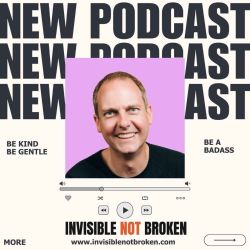
Vulnerability, Resiliency, and Advocacy with Tim Reitsma
47:06Monica Michelle is joined by consultant and podcast host Tim Reitma.Tim lives with Crohn's Disease.In this episode, Monica and Tim discuss: Tim’s resiliency through managing his Crohn’sThe importance of self-advocacy, especially in the workplace Tim’s podcast why he shares stories of those with invisible illness TIMESTAMPS00:47 - Tim's diagnosis 06:31 - How and why Tim applies self advocacy15:41 - Why Tim started his podcast22:42 - Invisible condition etiquette31:00 - What HR can do better for employees with invisible illness39:31 - Tools Tim uses to care for his Crohn’s outside the homeThe full transcript and all links mentioned can be found on the episode page on invisiblenotbroken.com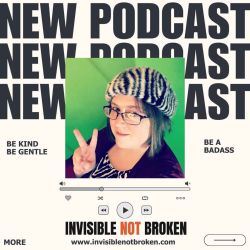
Tech and Disability: What VR Offers the Disabled Community with Sunny Ammerman
01:10:27Monica Michelle is joined by artist and disability advocate Sunny AmmermanSunny lives with Septo-optic dysplasia, panhypopituitarism, Optic Nerve Hypoplasia, and is missing a membrane in the brain called the "septum pellucidum".In this episode, Monica and Sunny discuss: Sunny’s complex disorders and how she copes with themEverything VR provides from accessible gaming, social platforms and the potential for better online education.Various VR/AR games and their gameplay Sunny’s VR support groupTIMESTAMPS00:45 - What VR/AR offers for chronically ill and disabled folks11:57 - Sunny’s conditions and how she copes with them17:55 - Features that make VR games accessible or inaccessible as well as different games and their play experiences37:13 - The social aspects of virtual gaming51:32 - What opportunities VR has for the future1:04:49 - Sunny’s VR support group The full transcript and all links mentioned can be found on the episode page on invisiblenotbroken.com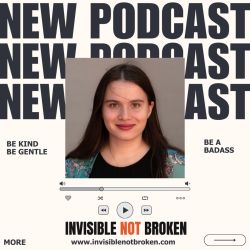
Reporting on Chronic Illness and Disability with Journalist Julia Metraux
39:16Monica Michelle is joined by Journalist Julia Metraux.Julia lives with vasculitis, mild to moderate hearing loss, and has experienced long COVID.In this episode, Monica and Julia discuss: Julia's diagnosis with vasculitis and how it influences her journalistic lensHow community impacts the mental health of those with chronic illnessHow Julia and Monica find positives and negatives in the internet spaces for chronically ill and disabled folksThe politics of how government, businesses, and celebrities influence the chronic illness community TIMESTAMPS00:32 - Julia's diagnostic journey07:02 - Julia’s work reporting on the online community of chronic illness 16:32 - The effect of Internet communities on chronically ill and disabled folks26:46 - How Julia’s illness impacts her work, both in what she writes about and how she manages her lifestyleThe full transcript and all links mentioned can be found on the episode page on invisiblenotbroken.com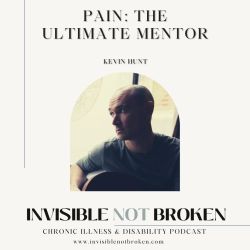
Author of “Pain: The Ultimate Mentor,” Physiotherapist Kevin Hunt
31:29Monica Michelle is joined by author & physiotherapist Kevin Hunt.Kevin lives with chronic pain.In this episode, Monica and Kevin discuss: Kevin’s philosophy of pain management as a physiotherapist who experiences chronic pain. The Hexagon Model, a life-management tool for focusing on what’s important to you.Kevin’s idea behind his new book.Using pain as a guide.TIMESTAMPS00:34 - Kevin’s work as a physiotherapist specializing in the experience of pain 06:44 - The Hexagon Model for managing your life’s needs14:00 - Putting aside the idea of a “quick fix”19:45 - Kevin’s personal experience with pain and how he uses it with patients28:44 - Kevin’s book, “Pain: The Ultimate Mentor”The full transcript and all links mentioned can be found on the episode page on invisiblenotbroken.com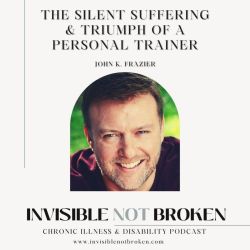
Author of “Through the Pain: The Silent Suffering & Triumph of a Personal Trainer”: John K. Frazier
28:35Monica Michelle is joined by author & personal trainer John K. Frazier.John lives with ankylosing spondylitis.In this episode, Monica and John discuss: John’s work as a physical trainer and authorChronic pain comparisonsPersonal triumphTIMESTAMPS00:50 - John’s business & diagnosis07:19 - Chronic pain olympics09:31 - Talking about & hiding a diagnosis15:09 - Personal triumph18:24 - Staying in the present23:29 - The superman complexThe full transcript and all links mentioned can be found on the episode page on invisiblenotbroken.com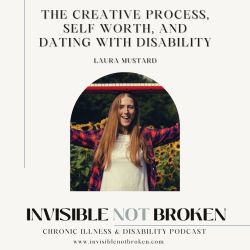
The Creative Process, Self Worth, and Dating with Disability: Laura Mustard
31:08Monica Michelle is joined by musician Laura Mustard.Laura lives with VATER syndrome.In this episode, Monica and Laura discuss: Laura’s inspiration for her upcoming musical EP.How Laura’s illness impacted her recent relationship & self-image.Laura’s creative process, new music, and social media pressure.TIMESTAMPS00:30 - Laura’s new EP / Monica’s recent COVID experience05:32 - Relationships with chronic illness11:20 - Image and self acceptance with disability15:32 - Laura’s creative process and current projects20:05 - Pursuing creativity despite social media attentionThe full transcript and all links mentioned can be found on the episode page on invisiblenotbroken.com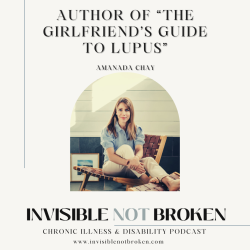
Author of “The Girlfriend’s Guide to Lupus”: Amanda Chay
30:43Monica Michelle is joined by author Amanda Chay.Amanda lives with Sjögren’s and Lupus.In this episode, Monica and Amanda discuss: Amanda’s book & diagnosisOutlooking on work & writingNavigating chronic illness with kids & familyTIMESTAMPS00:26 - Intro + The Girlfriend’s Guide to Lupus02:17 - Amanda’s diagnosis10:09 - Amanda’s outlook on writing17:11 - Navigating chronic illness with kids & family23:29 - Labels and roles26:24 - Flare reads & closing remarksThe full transcript and all links mentioned can be found on the episode page on invisiblenotbroken.com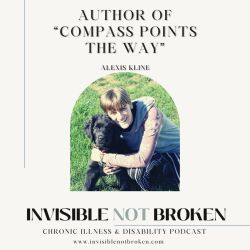
Author of “Compass Points the Way”: Alexis Kline
23:14Monica Michelle is joined by author Alexis Kline.Alexis lives with Dysautonomia.In this episode, Monica and Alexis discuss: Being a sick teenagerHaving an isolated diagnosisProductivity workflowsTIMESTAMPS00:28 - Alexis’s diagnosis & dog07:18 - Sick teenager road map10:00 - Alexis’s book & workflow16:25 - Having an isolated diagnosis20:50 - Wildlife photography, purchases The full transcript and all links mentioned can be found on the episode page on invisiblenotbroken.com
Author of “From the Sidelines to the Finish Line”: Emily Falcon
36:47Monica Michelle is joined by author Emily Falcon.Emily lives with ALCAPA.In this episode, Monica and Emily discuss: Growing up sickPost-surgery supportHaving a public bodySelf-motivation and adventuringTIMESTAMPS00:28 - Being a sick kid & Emily’s book title07:28 - Mortality10:16 - Portrayal of disability in media12:21 - Post-surgery support19:23 - Having a public body23:43 - Self-motivation29:46 - Emily’s tips for adventuresThe full transcript and all links mentioned can be found on the episode page on invisiblenotbroken.com